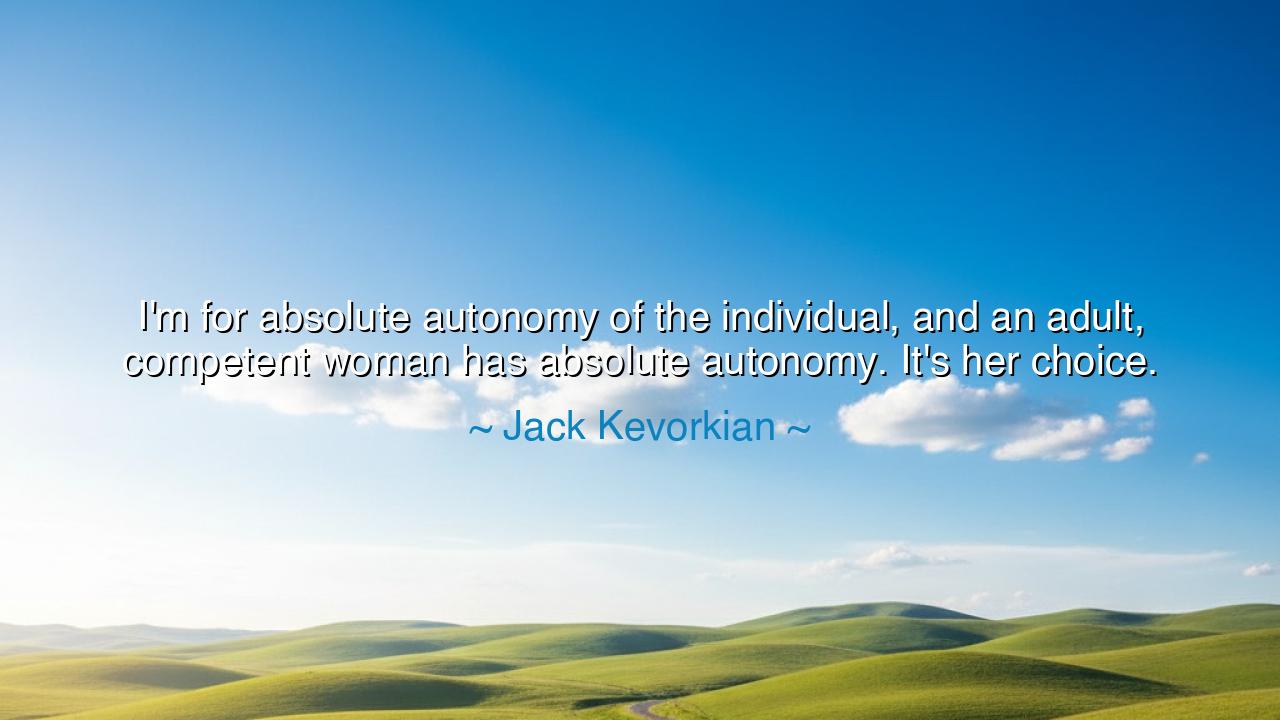
I'm for absolute autonomy of the individual, and an adult
I'm for absolute autonomy of the individual, and an adult, competent woman has absolute autonomy. It's her choice.






Hear the bold and unflinching words of Jack Kevorkian, the physician who walked the edge of medicine and morality: “I’m for absolute autonomy of the individual, and an adult, competent woman has absolute autonomy. It’s her choice.” These words, though spoken in our modern age, carry the timeless weight of an ancient principle — that the sovereignty of the soul is sacred, and no power on earth may rightfully rule over it. Kevorkian, known to many as “Dr. Death,” became a figure of fierce controversy for his belief that every human being, especially in the face of unbearable suffering, possesses the ultimate right to choose the manner and moment of their own passing. In this statement, he crystallized the core of his philosophy: that autonomy — the freedom of the self to govern its own life — is the highest expression of human dignity.
The origin of these words can be traced to Kevorkian’s lifelong struggle against the constraints of both law and custom. In the late twentieth century, he stood as a lone voice for what he saw as a forgotten truth — that compassion and freedom are not opposites, but companions. In helping terminally ill patients end their suffering through physician-assisted death, Kevorkian defied governments, medical institutions, and moral conventions. He was prosecuted, vilified, and even imprisoned. Yet through it all, he stood firm upon this rock: that individual autonomy is absolute. To him, every person — and especially every woman, so often denied authority over her own body throughout history — held within themselves the divine right of choice. His words echoed not rebellion, but reverence for the sacredness of the individual will.
The ancients, too, wrestled with this question of autonomy. In the dialogues of Socrates, we find the seed of Kevorkian’s belief. Socrates taught that the body belongs to the self, not to the state, and that reason, not fear, should guide our choices — even in death. When condemned to die by the hemlock, he faced his fate with calm acceptance, asserting that it was better to die by one’s own reason than live under the tyranny of false authority. Likewise, Kevorkian’s insistence on the autonomy of the individual springs from that same lineage of thought — that freedom is not merely political, but existential. It is the right to determine one’s own life, to define one’s own limits, and to act according to conscience rather than coercion.
To say, as Kevorkian did, that an adult, competent woman has “absolute autonomy” is to speak against the long tide of history. For countless generations, women were denied ownership of their bodies, their decisions, their destinies. Their choices were bound by law, religion, and the expectations of others. In affirming the woman’s choice, Kevorkian joined a broader chorus of moral awakening — one that extends beyond the question of life and death to the very essence of equality. To claim one’s autonomy is to claim one’s humanity. It is to say, “I am not property, nor patient, nor subject, but sovereign.” His statement thus rises beyond medicine into the realm of moral revolution: a call for every soul to reclaim the right to steer its own course.
Yet Kevorkian’s teaching is not without its burden. Absolute autonomy demands courage. It requires that one accept the weight of one’s decisions without hiding behind law, doctrine, or public opinion. It is easy to surrender freedom to others — to let them decide what is right, what is good, what is safe. But to live as an autonomous being is to walk a narrow and sacred path, one that demands both self-knowledge and compassion. Kevorkian’s vision was not of chaos, but of responsibility — that the free individual, guided by conscience and reason, must act with integrity toward self and others. Freedom without wisdom leads to ruin, but freedom with understanding leads to dignity.
History offers examples that mirror this balance. Consider Antigone, the tragic heroine of ancient Thebes, who chose to bury her brother against the king’s decree. In her defiance, she claimed autonomy over her moral law, asserting that divine justice outweighed the commands of men. She paid with her life, yet her courage resounds through the centuries. Like Antigone, Kevorkian believed that there are times when obedience to authority is betrayal of the self. Both stood before the might of institutions and said, “The conscience of the individual is greater than the decree of kings.” In this, they remind us that freedom is not granted — it is lived, even at the cost of suffering.
O listener, take this wisdom into your heart. Autonomy is not a gift to be received; it is a discipline to be earned. Know yourself — your values, your limits, your truth — and live according to them. Let no one, whether priest, politician, or public opinion, dictate the choices that belong to your soul. But wield that autonomy with care, for freedom untempered by compassion becomes cruelty, and choice without reflection becomes folly. Remember that the power to choose is not only a right but a duty — a duty to honor the sanctity of your own life and to respect the autonomy of others.
Thus, the legacy of Jack Kevorkian endures as both challenge and commandment: that the ultimate measure of freedom lies not in the laws of nations, but in the integrity of the self. To be independent is not merely to act — it is to act with wisdom, compassion, and courage. And to live in this way is to fulfill the highest calling of humanity: to be the master of one’s own body, the steward of one’s own mind, and the author of one’s own fate.






AAdministratorAdministrator
Welcome, honored guests. Please leave a comment, we will respond soon